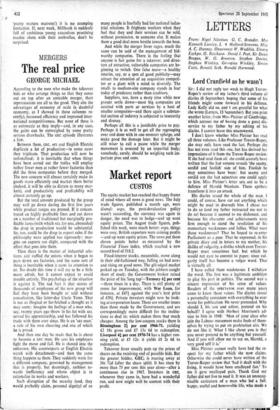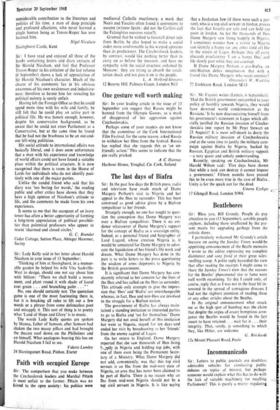Lord Cranfield as he wasn't
LETTERS
From: Nigel Nicolson G. C. Brander, Mrs Kenneth Lumley, L 4 Holford-Strevens, Miss A. C. Hannay, Onyenauzi W. Wadibia, Unzera Ezekpo, G. Reichardt David I. Peet, Sir Denis Brogan, W. G. Brunton, Stephen Davies. Stephen Winkley, Gewrgina Winkley, Simon Cutts, Ronald Seth. Ronald Harwood.
Sir: I did not reply last week to Hugh Trevor- Roper's review of my father's third volume of diaries (6 September). hoping that some of his friends might come forward to his defence. Lady Kelly did so, and 1 am grateful for what she wrote (Letters, 13 September). But you print another letter, from Miss Pleister of Cambridge, which accuses me of having done a great dis- service to my father by my editing of his diaries. I cannot leave this unanswered.
I don't know whether Miss Pleister has read all three volumes. Like Professor Trevor-Roper, she may only have read, the last. Perhaps she has not even read this one, but has derived her impressions of it from the Trevor-Roper review. If she had read them all. she could scarcely have written that the last volume reveals 'the seamy, sordid and foolish" side of him. Foolish' he may sometimes have been: but seamy and sordid are the last adtectives one could apply to him. Miss Pleister's letter sets out to be a defence of Harold Nicolson. These epithets transform it into an attack.
His diaries reveal the whole of the man. I could, of course, have cut out anything which might be used to discredit him. chose not to do so (and my father instructed me not to do so) because it seemed to me dishonest, and because his character and achievements were firm enough to stand the revelation of his momentary weaknesses and follies. What were those weaknesses? That he hoped to re-enter Parliament as a peer. That he expressed, in his private diary and in letters to my mother, his dislike of vulgarity, a dislike which even Trevor- Roper must sometimes feel,. but which he would not care to commit to paper, since vul- garity itself has become a vulgar word. That is virtually all. .
I have called them weaknesses. I withdraw the word. The first was a legitimate ambition to play his part in politics. The second was a sincere expression of his sense of values. Readers of the SPECTATOR over many years came to know those. values. The diaries reveal a personality consistent with everything he ever wrote for publication. He never pretended. Why should I, his .son and editor, pretend on his behalf? I agree with Herbert Morrison's- ad- vice to him in 1948: 'Men of your class who join the Labour movement make fools of them- selves by trying to put on proletarian airs. We do not like it. What I like about you is that you never pretend to be anything but yourself. And if you will allow me to say so, Harold, a very good self it is.'
Miss Pleister cannot really have had the re- spect for my father which she now claims. Otherwise she could never have written of the Trevor-Roper review that 'had it dealt with the living, it would have been unalloyed fun.' To me it gave unalloyed pain. Thank God my father did not live to read it. It was an unrecog- nisable caricature of a man who led a full, happy, useful -and -honourable life, who made a
considerable contribution to the literature and politics of his time, a man of deep principle and profound affections, who never harmed a single human being as Trevor-Roper has now harmed him.











































 Previous page
Previous page